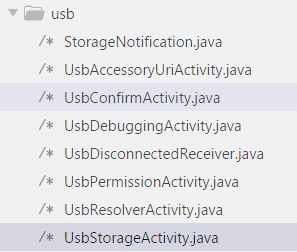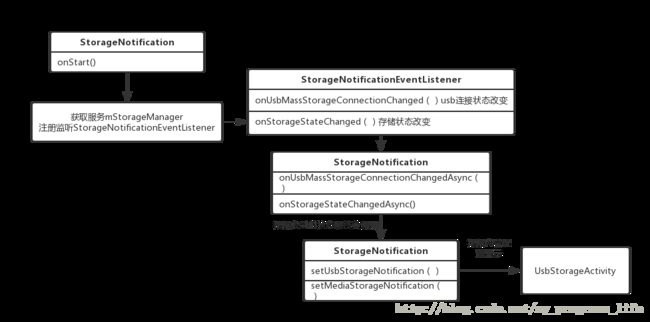Android学习 ——SystemUIService之StorageNotification分析
usb 这块的内容较多,但是抽取核心部分之后就比较容易理解

**查看文件目录,其实在SystemUIService 启动中相关的类只有StorageNotification.java和UsbStorageActivity.java
StorageNotification负责逻辑处理,UsbStorageActivity负责显示**
下面是StorageNotification.java 的主要函数关系图

先看入口函数
@Override
public void start() {
mStorageManager = (StorageManager) mContext.getSystemService(Context.STORAGE_SERVICE);
final boolean connected = mStorageManager.isUsbMassStorageConnected();
if (DEBUG) Log.d(TAG, String.format( "Startup with UMS connection %s (media state %s)",
mUmsAvailable, Environment.getExternalStorageState()));
HandlerThread thr = new HandlerThread("SystemUI StorageNotification");
thr.start();
mAsyncEventHandler = new Handler(thr.getLooper());
StorageNotificationEventListener listener = new StorageNotificationEventListener();
listener.onUsbMassStorageConnectionChanged(connected);
mStorageManager.registerListener(listener);
}先获取了STORAGE_SERVICE,然后给mStorageManager 注册了监听 StorageNotificationEventListener
private class StorageNotificationEventListener extends StorageEventListener {
//连接改变
public void onUsbMassStorageConnectionChanged(final boolean connected) {
mAsyncEventHandler.post(new Runnable() {
@Override
public void run() {
onUsbMassStorageConnectionChangedAsync(connected);
}
});
}
// 存储状态改变
public void onStorageStateChanged(final String path,
final String oldState, final String newState) {
mAsyncEventHandler.post(new Runnable() {
@Override
public void run() {
onStorageStateChangedAsync(path, oldState, newState);
}
});
}
}StorageNotificationEventListener 主要是监听两个函数
onUsbMassStorageConnectionChanged(usb连接变化)
onStorageStateChanged (存储状态变化)
在这两个函数中又主要使用了
onUsbMassStorageConnectionChangedAsync()
onStorageStateChangedAsync()
在事件监听中会返回一系列的状态值,根据不同的状态值配置显示标题,内容,使用UsbStorageActivity 显示
代码片段截取
if (newState.equals(Environment.MEDIA_CHECKING)) {
/*
* Storage is now checking. Update media notification and disable
* UMS notification.
*/
setMediaStorageNotification(
com.android.internal.R.string.ext_media_checking_notification_title,
com.android.internal.R.string.ext_media_checking_notification_message,
com.android.internal.R.drawable.stat_notify_sdcard_prepare, true, false, null);
updateUsbMassStorageNotification(false);
}上述配置需要显示的内容
下面为配置到UI显示以及设置发送存储相关的通知
void updateUsbMassStorageNotification(boolean available) {
if (available) {
Intent intent = new Intent();
intent.setClass(mContext, com.android.systemui.usb.UsbStorageActivity.class);
intent.setFlags(Intent.FLAG_ACTIVITY_NEW_TASK);
PendingIntent pi = PendingIntent.getActivity(mContext, 0, intent, 0);
setUsbStorageNotification(
com.android.internal.R.string.usb_storage_notification_title,
com.android.internal.R.string.usb_storage_notification_message,
com.android.internal.R.drawable.stat_sys_data_usb,
false, true, pi);
} else {
setUsbStorageNotification(0, 0, 0, false, false, null);
}
} private synchronized void setUsbStorageNotification(int titleId, int messageId, int icon,
boolean sound, boolean visible, PendingIntent pi) {
// force to show UsbSettings screen to select usb mode if property is true
if (SystemProperties.getBoolean("persist.sys.ums", true)) {
titleId = 0;
messageId = 0;
icon = 0;
sound = false;
visible = false;
pi = null;
}
if (!visible && mUsbStorageNotification == null) {
return;
}
NotificationManager notificationManager = (NotificationManager) mContext
.getSystemService(Context.NOTIFICATION_SERVICE);
if (notificationManager == null) {
return;
}
if (visible) {
Resources r = Resources.getSystem();
CharSequence title = r.getText(titleId);
CharSequence message = r.getText(messageId);
if (mUsbStorageNotification == null) {
mUsbStorageNotification = new Notification();
mUsbStorageNotification.icon = icon;
mUsbStorageNotification.when = 0;
}
if (sound) {
mUsbStorageNotification.defaults |= Notification.DEFAULT_SOUND;
} else {
mUsbStorageNotification.defaults &= ~Notification.DEFAULT_SOUND;
}
mUsbStorageNotification.flags = Notification.FLAG_ONGOING_EVENT;
mUsbStorageNotification.tickerText = title;
if (pi == null) {
Intent intent = new Intent();
pi = PendingIntent.getBroadcastAsUser(mContext, 0, intent, 0,
UserHandle.CURRENT);
}
mUsbStorageNotification.setLatestEventInfo(mContext, title, message, pi);
final boolean adbOn = 1 == Settings.Global.getInt(
mContext.getContentResolver(),
Settings.Global.ADB_ENABLED,
0);
if (POP_UMS_ACTIVITY_ON_CONNECT && !adbOn) {
// Pop up a full-screen alert to coach the user through enabling UMS. The average
// user has attached the device to USB either to charge the phone (in which case
// this is harmless) or transfer files, and in the latter case this alert saves
// several steps (as well as subtly indicates that you shouldn't mix UMS with other
// activities on the device).
//
// If ADB is enabled, however, we suppress this dialog (under the assumption that a
// developer (a) knows how to enable UMS, and (b) is probably using USB to install
// builds or use adb commands.
mUsbStorageNotification.fullScreenIntent = pi;
}
}
final int notificationId = mUsbStorageNotification.icon;
if (visible) {
notificationManager.notifyAsUser(null, notificationId, mUsbStorageNotification,
UserHandle.ALL);
} else {
notificationManager.cancelAsUser(null, notificationId, UserHandle.ALL);
}
}